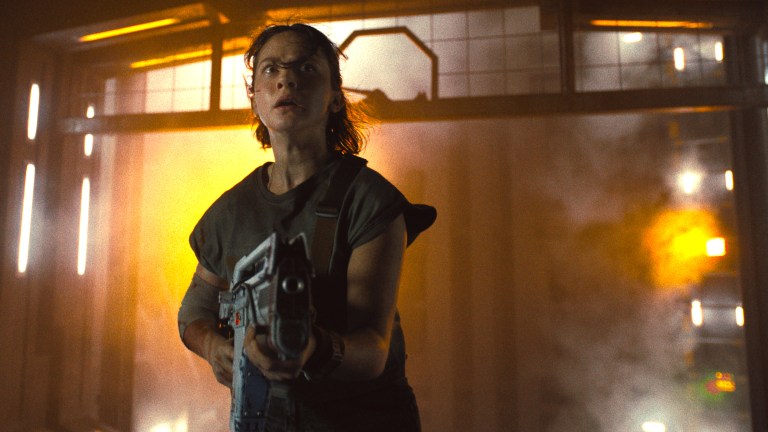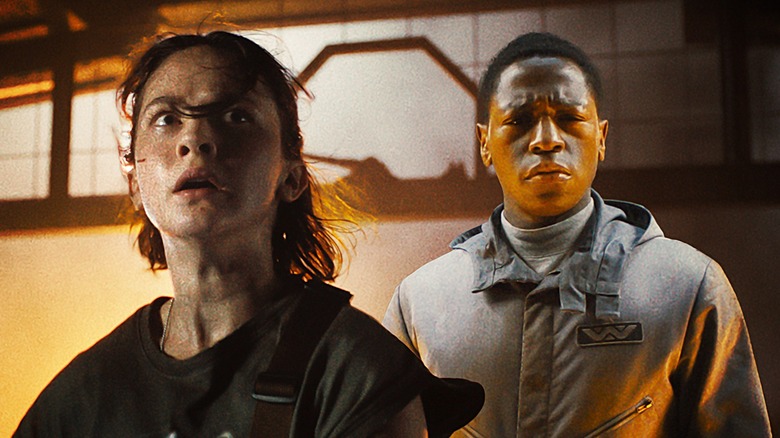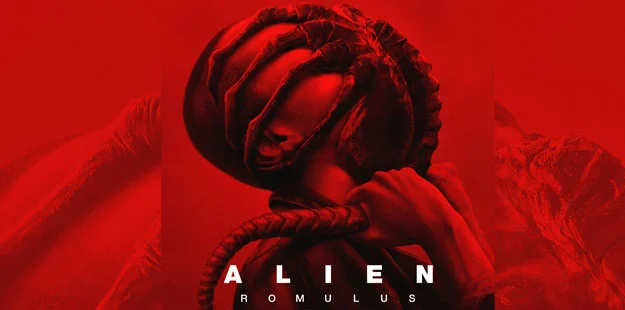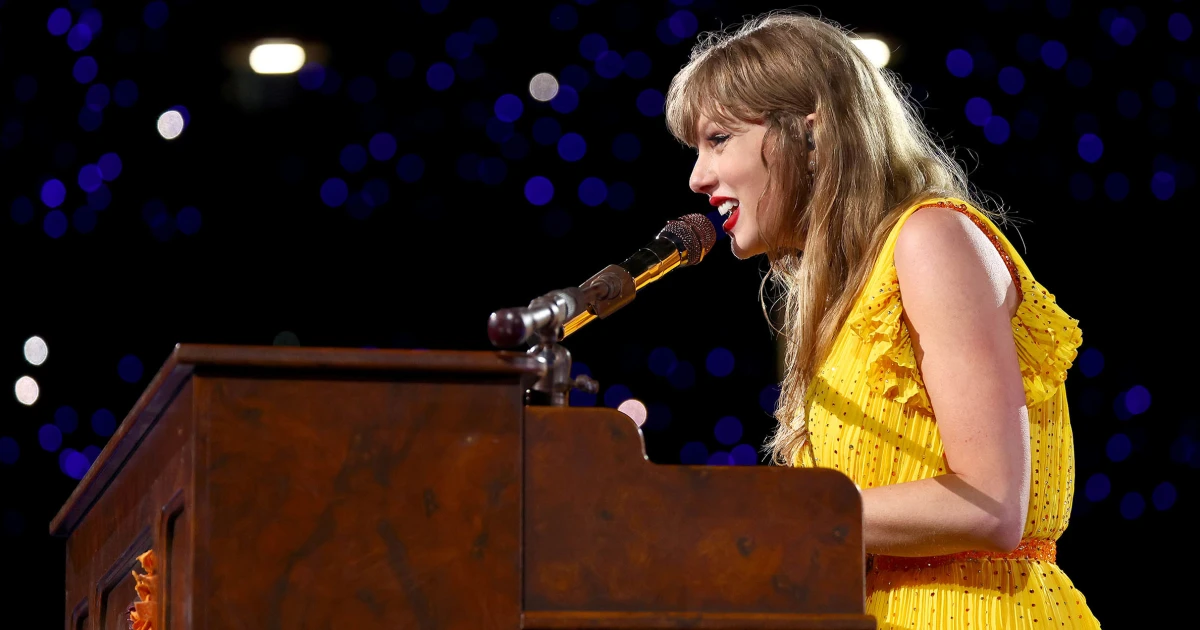Fede Álvarez pays respect to its great forebears and creates a distinctive, blood-soaked identity of its own by delivering a carnally charged, visually spectacular, and relentlessly savage entry with "Romulus."
The Alien series has long flourished on the malleability of its core idea: place naive people in a small area with a perfect predator, then see as terror, despair, and a lot of carnage results. Still, this basic formula has been sifted via the unique prism of its filmmakers with every installment. From James Cameron's explosive, adrenaline-fueled sequel to Ridley Scott's claustrophobic original, a terrible meditation on isolation and corporate apathy, each film has left its own visual and thematic impression on the series. Now Fede Álvarez, the modern godfather of the grotesque, has shaped his vision of the franchise into a psychosexual nightmare embracing its roots with both oeze-soaked hands and yanks us into a relentless, viscerally charged cinematic experience redefining the potential for nostalgia-fueled franchise instalments.
Between the events of Scott's Alien and Cameron's Aliens, Romulus offers not originality but rather refining. The seasoned Uruguayan horror enthusiast behind Evil Dead and Don't Breathe appreciates the tradition of the brand with fangirl fervor and guides Romulus away from the dangers of reinventions. Rather, Álvarez chooses a return to form, paying tribute to the gritty roots of the franchise and thus infuses it with a strong dose of modern sensibility.
Desperate to escape their miserable existence, a group of adolescent colonists on a mining planet develop a simple, almost ascetic scheme to seize an apparently abandoned spacecraft. Naturally, they find that this twin-ship, Romulus and Remus, is not empty.

Romulus is brilliant mostly in its mood. Working with long-time friend Rodo Sayagués, Álvarez co-writes knowing that behind the biomechanical horrors of the series is its repressive ambiance of approaching catastrophe. The main location of the film, a sunless, crumbling Weyland-Yutani Corp mining colony, has some amazing production design where rusted metal, poisonous fog, and the faint glow of industrial lights create a grunge dystopia. The constant grind of corporate exploitation has made this third-world outpost lived-in, worn down and where hope dies. Though it mimics the claustrophobic atmosphere of Scott's original, it feels even more oppressive, more unavoidable, and grounds the slaughter to come in a harsh reality through some amazing world-building.
Leading Cailee Spaeny as Rain, the young ensemble deviates from the world-weary team of the original movies. Unlike the steely resiliency of Sigourney Weaver's Ripley or the cold pragmatism of Michael Biehn's Hicks, Spaeny offers a raw, unrefined determination to the part. Rain's sensitivity does not, however, lessen her strength. Rather, it turns her into a clever, flexible survivor negotiating the weight of existence in a world devoid of value for the weak. As the Android Andy, David Jonsson strikes a portrayal that is both kind and disturbing as he alternates between an innocence that draws you in and a detachment that leaves you uneasy.
Romulus also slips a heart behind its breast plate of dread, for all its blood-drenched display. Rain's bond with her Android "brother," Andy, injects tenderness into the otherwise unrelenting violence. Their energetic tweaks on the recurring Alien theme—the search for humanity in a society often seeming to be intended to take away—showcase their own.
Still, of course, Romulus's true stars are clearly the legendary works of H.R. Giger. Álvarez, a horror auteur with a propensity of leaving a trail of viscera in his wake, does not hold back in capturing them in all their terrible grandeur. The set pieces in the movie are masterpieces in suspense; Álvarez is arranging gut-wrenching sequences that will probably make you squirmingly uncomfortable. Though it never feels gratuitous, the gore is profuse and the violence is relentlessly vivid. Every spattering of flesh, every ripped membrane reminds us of the frailty of the human body and the relentless, merciless primality of the xenomorphs. You may also read this:Trap Review: A Wily Josh Hartnett Propels M. Night Shyamalans

The most disturbing moments in the movie center on the terrible hunt of the beast, but they also highlight the strange familiarity of such meetings. Álvarez stays on the invasiveness of these events, with ever more terrible things born from the deadly embrace of every phallic entity. As was the case with his Evil Dead, the body in Álvarez's perspective is a site of a twisted, bestial violation that ends in a scandalising last act rather than merely a vehicle for destruction in ever inventive ways.
Leading the most remarkable sound design this year is Lee Gilmore. All of it is presented as a startling sensory experience that's shockingly immersive: the theater-rattling departure into space, the hiss of acid cutting through steel and flesh both, the awful squelch of bodies being torn apart and chest's being burst apart. The air of anxiety that permeates every shot is complemented by Benjamin Wallfisch's sleek synth-laden melodies and deftly veiled allusions to earlier movies.
Romulus marks a fresh, rich ground for the horrors of the Alien series legendary genealogy, crafting a narrative of solitude, corporate insouciance, and the terrible beauty of life's most basic anxieties. Simply said, this is one of the most fun genre flicks available this year; it celebrates its filthy gore and relentless suspense. Alien Romulus is a ride worth riding regardless of your level of loyalty to the franchise—newcomer or die-hard fan—though you might need to pack a strong stomach for the trip.









.webp)


